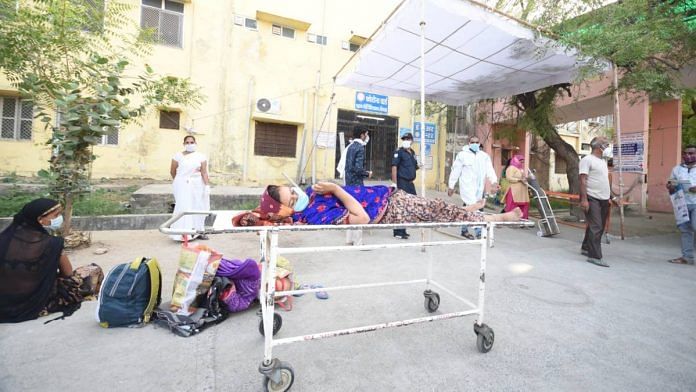
Thank you dear subscribers, we are overwhelmed with your response.
Your Turn is a unique section from ThePrint featuring points of view from its subscribers. If you are a subscriber, have a point of view, please send it to us. If not, do subscribe here: https://theprint.in/
India is an extremely poor country. This covid crisis has brought this fact to the centre of all the arguments. Just because some of us have access to OTT platforms, world class brands, gated communities, 24 hours delivery and cheap internet, we had brushed this reality under the carpet. Covid made it brazen. This made us guilty conscience that we are gasping for basics including hospital beds, oxygen, medicines, and ventilators. It made all of us pause and reflect.
One does not need to be a public health expert to gauge this. India’s total healthcare spending (Centre + States) stands at ~1.6% of GDP, which is way lower than that of other countries. This number ranges from 8% – 12% for the developed world (a higher percentage on a higher GDP base cumulated over the years). The total per capita government spending on healthcare has nearly doubled from ₹1,008 ($13) per person in FY15 to ₹1,944 ($26) in FY20 on back of Aayushman Bharat but is still abysmally low.
In hindsight, it is understandable. Policymakers across various governments had to prioritize other important welfare schemes over healthcare infrastructure and delivery. They had to prioritize defence budgets over Primary Healthcare Centres. This has resulted in a situation that we have indigenous Tejas in our backyard, but we are seeking oxygen concentrators. In a sub USD 4,000 GDP per capita country, it is imperative for policymakers to prioritize and with elections always in sight, welfare schemes got the precedence over long term healthcare infrastructure and delivery.
There is no denying that government could have done better, and we should not allow them to shift blame on others, but a part of the blame must lie with us as well. We must understand that Governments do not earn money on their own, first they create conducive policies with an objective to unleash the animal spirit of private sector and then they tax them to provide a cushion to the most vulnerable section of the society. But because, as a citizen, we never valued our private sector, we allowed state to let them perish, as a result of our draconian land and labour reforms, government red-tapism and retrospective policy changes. We never allowed them to flourish and compete with global companies which would have resulted in creating more jobs and prosperity for all of us. After all, it’s the private sector which makes oxygen concentrators, ventilators, vaccines and essential medicines. As a country, we have always looked towards the private sector with scepticism. The result is that despite what we may feel, we are still a pre-industrialized country. Albeit sooner, we will be world’s first pre-industrialized 5 trillion-dollar economy.
We should not let people die to read the writing on the wall but the fact is that if we would have got over the Covid after the first wave, there was absolutely no way our policymakers would even have looked at our healthcare infrastructure and delivery for the next 20-30 years as well. They would have continued to sing lullabies for decades. This has changed. Governments spend on healthcare was always considered as an ‘expenditure’ which, we have realized now, was actually an ‘investment’. Infrastructure is not merely constructing roads and flyovers, developing education and healthcare infrastructure is equally critical for handling the future shocks and has a long-term multiplier effect on the economy.
We do understand that beyond a limit there is not much any political leader could have done basis our limited health infrastructure during such a pandemic. However, Hon’ble Prime Minister must decide now on what he intends to do after this crisis. If he wants to create a legacy for himself that is remembered for generations in a positive way, he will have to turnaround India’s healthcare infrastructure. This country deserves a better quality of life for its citizens. We can not let our fellow citizens die feeling merely helpless.
The onus is on us as well. We must let go of our quest for freebies from Governments so they can deploy the tax funds on creating long-term assets. We must celebrate entrepreneurship and usher an environment that promotes innovation and scientific temper. We must remind ourselves that Socialism cannot be practised in isolation, it must be complemented by strong Capitalism (Government’s role is to ensure it does not lead to Crony-Capitalism). The two are not contradictory but rather complimentary to the vision of any country.
Until then, we must ask the right questions to our leaders and demand transparency in their decision making because Citizen 2.0 must precede Governance 2.0.
Also read: SubscriberWrites: If Covid is the bowler, India is paying the price for taking its eye off the ball
These pieces are being published as they have been received – they have not been edited/fact-checked by ThePrint.

COMMENTS